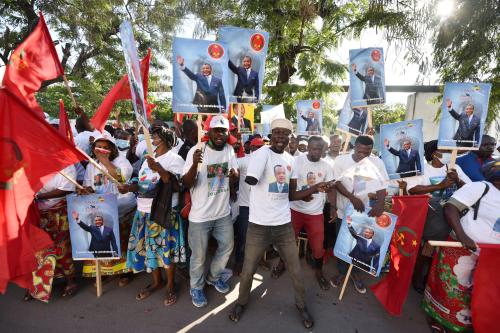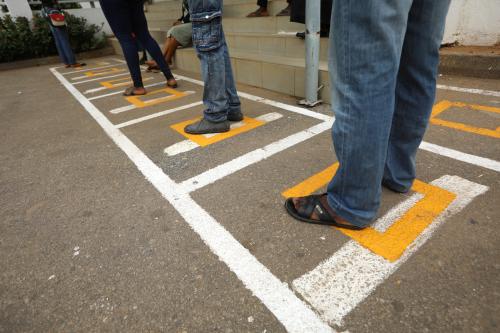South Sudan peace talks break down while its parliament extends president’s term to 2021
The tenuous peace negotiations over the civil war in South Sudan broke down this week as the faction supporting former Vice President Riek Machar rejected a deal that would have reinstated him. Negotiations over recent weeks have been fraught with misunderstandings and weak enforcement: The cease-fire agreed just two weeks ago broke down hours after it had been instated. According to Deutsche Welle, on July 8, the leaders left the meeting with conflicting accounts over whether a power-sharing agreement was even reached.
It seems that the rebels had been looking for more from the negotiations—namely institutional adjustments that would check President Salva Kiir’s power base—according to Reuters. “We will not fall only for the position of the First Vice President in this negotiation. We are focusing more on structural and institutional issues to constrain Kiir’s regime both in the executive and legislature,” said Puok Both Baluang, deputy spokesman for the largest rebel group. Meanwhile, on July 11, South Sudan’s Parliament voted to extend Kiir’s presidential term for three years, allowing him to stay in power until 2021. The extension applies to vice presidents, state lawmakers, and governors as well. Critics believe that the move will undermine the already fragile peace talks, but Paul Youani Bonju, chairman of the parliament’s information committee, has stated that the law will instead “bolster the government team” at the negotiations.
On July 10, the United Nations (U.N.) announced that the recent attacks by the government in Unity state in April and May earlier this year, which killed 232 civilians along with committing mass rape may amount to war crimes. On Friday, the U.N. Security Council approved an arms embargo on the country. Tens of thousands of people have already died and millions have fled their homes in the civil war that has endured since 2013.
Ethiopia and Eritrea affirm peace deal and re-establish ties
In April, Ethiopia’s Prime Minister Abiy Ahmed announced in his inaugural address his commitment to end the border dispute and repair ties with neighboring Eritrea after two decades of war. In that vein, last month, the ruling Ethiopian People’s Revolutionary Democratic Front (EPRDF) fully accepted the 2000 Algiers peace agreement and the subsequent ruling issued by an international border commission, essentially declaring its intention to withdraw Ethiopian troops from disputed territories. This week, Abiy met with his Eritrean counterpart, President Isaias Afweki, in Eritrea’s capital of Asmara and cemented a peace deal, declaring the end to hostilities and normalizing relations between the two countries. Notably, the agreement called for the Ethiopian telecom service Ethio-Telecom to restore its phone lines with Eritrea, opening up communications and prompting phone calls—between family, friends, and even strangers—in the two countries to resume, reported The New York Times.
The governments also agreed to jointly develop ports along Eritrea’s coast, reconnect their countries via road and air transit, and reopen embassies in both countries. While both Ethiopia and Eritrea stand to gain from the prospect of increased cross-border trade and through the use of Eritrea’s ports, Eritrea will also now have access to potash reserves that were formerly a part of the disputed territory along the two countries’ border. On Friday, Eritrean President Isaias Afwerki announced that he would be heading to Addis Ababa for three days, starting on Saturday, just a week after Ethiopian Prime Minister Abiy Ahmed visited Asmara.
Nigerian oil refinery expected to commence operations in 2020, and hydropower project gets approval in Zimbabwe
An oil refinery under construction near Lagos by Dangote Industries Ltd. is expected to fully operation by mid-2020, according to Edwin Devakumar, the company’s group executive director. The refinery is expected to be one of the world’s largest and will process 650,000 barrels of crude oil per day. The refinery is also expected to meet Nigeria’s demand for gasoline, much of which is currently imported even though Nigeria is Africa’s largest crude producer. As part of the project, the company is also building a fertilizer plant at the site, which will produce 3 million tons of fertilizer each year. According to the Financial Times, the full refinery project is expected to cost around $12 billion.
In other energy news, this week President Emmerson Mnangagwa announced that Zimbabwe and Zambia have reached an agreement on the development of the Batoka Gorge Hydro Electricity project. The project will create 6,000 jobs, produce 1600 megawatts of power, and is expected to cost $4.5 billion. The project, once completed, is expected to alleviate power shortages in both countries. As part of the planning process, technical experts from Zimbabwe and Zambia are meeting this week to finalize more details.






Commentary
Africa in the news: South Sudan peace breaks down, Ethiopia-Eritrea peace cemented, and major energy projects make progress
July 14, 2018